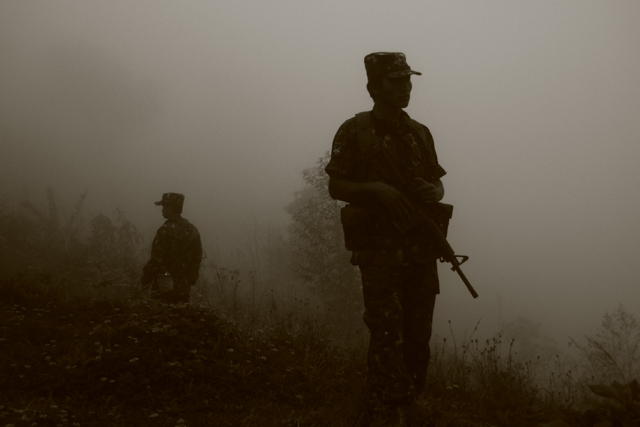The Burmese army attacked another outpost belonging to the Shan State Army-South (SSA-S) close to Sino-Burmese border on Thursday morning, according to rebel sources.
A spokesperson for the ethnic rebel group told DVB that an outpost in northern Shan state’s Namhkam township came under attack by about 50 Burmese army soldiers from Military Operation Command 16, forcing the group to return fire.
Sai Hseng Murng told DVB that there are two possible reasons for the attack, including their suspicion that the SSA-S is responsible for the disappearance of four Burmese “civilians”, who rebels suspect to be military intelligence personnel.
It follows news that on Sunday another rebel outpost in Namhkam was raided and torched by the Burmese army, who alleged to be looking for the four missing people.
But Sai Hseng Murng added that it could also be linked to a recent dispute with a pro-government militia group, who is allegedly unhappy with their plans to open a rehabilitation centre for drug users in the area.
While it was not clear whether the militia troops were part of this morning’s assault, Sai Hseng Murng said that they had joined the Burmese soldiers in torching an SSA-S outpost on Sunday.
A Shan soldier was injured during this morning’s clash and gunfire could be heard throughout the afternoon, he said, although a full list of casualties was not yet known.
Over 1,000 residents from eight villages located alongside the Ruili River were forced to flee their homes, according to Sai Kyaw Ohn, Lower House representative for the Shan Nationalities Democratic Party in Namhkam. He told DVB that some of the displaced had sought shelter either with relatives or at a Buddhist monastery in Namhkam town, while others had crossed the border into China.
Hkun Tun Oo, chairperson of Shan opposition party, the Shan Nationalities League for Democracy, criticised President Thein Sein for failing to rein in the army, despite reaching a union-level ceasefire agreement with the SSA-S last year.
“The [president] has no control over the army,” said Hkun Tun Oo. “[They] are running things differently from the state.”
Despite reaching a tentative ceasefire deal in December 2011 and a union-level agreement the following year, the SSA-S and the Burmese army continue to engage in regular clashes. Sai Lao Hseng said the group has sent letters to the Burmese government after each clash, but rarely received a response. He warned that the army’s hostility could lead to further distrust and violence.
The SSA-S is one of Burma’s largest armed ethnic groups, and has been fighting for greater autonomy and ethnic rights in Burma for over half a century.



